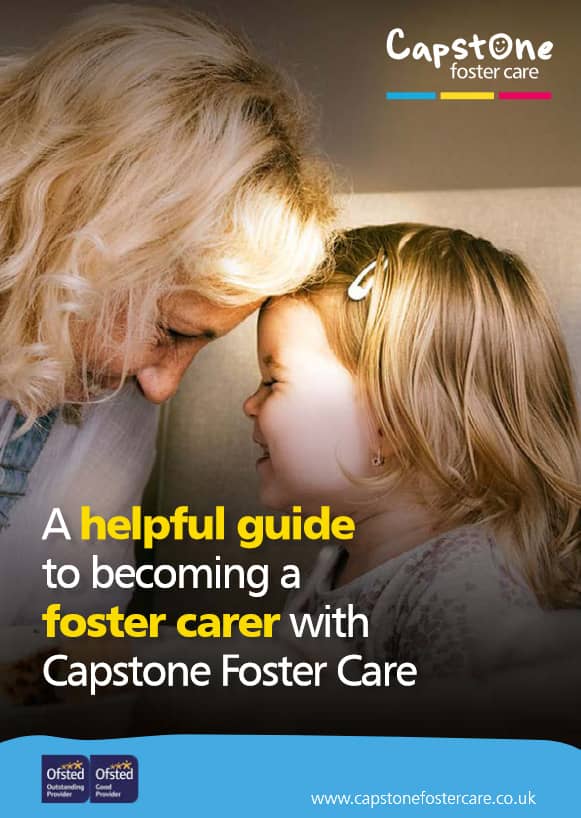


Fostering a disabled child
The role of an independent fostering agency
How to choose a foster care agency
Can I choose who I foster?
What are the benefits of fostering with an independent fostering agency?
What happens when a child is taken into care?
Fostering process: what happens on an initial home visit?
Fostering with local authority vs independent agency
A complete guide to becoming a foster carer
How Are Children in Foster Care Matched with Carers?
Foster Care Budgeting Tips
Becoming A Foster Carer
What is a Care Leaver?
What is a Foster Carer?
Fostering Regulations
How long does it take to become a Foster Carer?
What are the Foster Care requirements?
Changing IFA - Transferring to Capstone
8 reasons why a child may be taken into care
Fostering as a Career
Can you foster if you smoke or vape?
A guide to fostering assessments
LGBTQ+ Fostering
Equality, Inclusion & Anti-discriminatory Practice in Foster Care
What can disqualify you from foster care?
Can you foster if you’re on benefits?
Top transferable job skills to become a foster carer
Fostering as a same sex couple
Fostering while renting
Can you foster if you have mental health issues?
Is there an age limit for fostering in the UK?
Do foster carers get a pension?
How to foster a child: A step by step guide
How do DBS Checks Work?
Can I foster if...?
Mythbusting the top 10 Foster Care Myths
Can I foster if I am disabled?
LGBT Fostering Mythbusting
Can I foster if I have pets?
Can I Foster A Child?
Can I Foster and Work?
Can you Foster with a Criminal Record
Can Single People Foster?
LGBT Family and Foster Care
Fostering across Cultures
Muslim Fostering
Christian Foster Care
Sikh Fostering
Empty Nest Syndrome and Foster Care
Can I Foster?
What is the difference between residential care and foster care?
Fostering Babies and Young Children
What is Kinship Care?
Fostering Babies - Myths
Focusing on Parent & Child Fostering
Fostering Siblings
Fostering Teenagers
Fostering Teenagers - Breaking down the Myths
Fostering Unaccompanied and Asylum Seeking Children
Mother and Baby Foster Placements
Private Fostering
How does therapeutic fostering work?
Young Children Fostering Placements
Difference between short and long-term fostering
Types of self-harm
A Guide to the Foster Care Handbook
Reunification and Birth Parents: A Guide for Foster Carers
What is an EHC Plan? A Guide for Foster Carers
How to prepare a child for becoming a care leaver
Children who foster: impact of fostering on birth children
Fostering LGBTQ+ Youth
How to prepare your home for a foster child
How to help a lonely child: A Guide for Foster Carers
What are the National Minimum Standards for Fostering Services?
10 tips for foster children's education
How to prepare your foster child for secondary school
Tips for coping when foster placements end
Tips for foster parents during Coronavirus
What happens if foster parents get divorced?
5 ways to manage Mother's Day with foster children
Tips for managing foster children's bedtime routines
How to handle foster child bullying
Fostering allowances and the gender pay gap
What discounts can foster carers get?
How to adopt from Foster Care
5 ways to manage Father's Day for children in foster care
8 most common fostering challenges
FosterTalk Membership with Capstone Foster Care
Supporting foster children's contact with birth families
A guide to independent fostering
Keeping Children Safe Online: A Guide For Foster Carers
Movies About Foster Care
Play-based learning strategies for foster carers
A Guide to the Staying Put Program
Why Foster Parent Wellbeing Matters
How to deal with empty nest syndrome
How to recognise signs of depression in foster children
Can you take a foster child on holiday?
Tips and advice on fostering with a disability
10 tips on connecting with your Foster Child
Fostering vs Adoption - What's the difference?
How Fostering can change a future
How to adopt from Foster Care
How to encourage children to read in Foster Care
How to prepare a Foster Child's bedroom
Reading and Storytelling with Babies and Young Children
Supporting Children's Learning
The 20 most recommended books Foster Carers and young people should read
Things you can do when your children leave home
The impact of early childhood traumas on adolescence and adulthood
Anxious Disorders in Foster Children
What is sexual abuse and sexual violence
Foster Child behaviour management strategies
Foster Parent Advice: What to expect in your first year of fostering
Capstone's twelve tips at Christmas
10 celebrities who grew up in Foster Care
Could Millenials be the solution to the Foster Care crisis?
Do you work in Emergency Services?
Form F Assessor and Assessment Training
Foster Care Fortnight
Improving Children's Welfare - Celebrating Universal Children's Day
New Year - New Career - Become a Foster Carer
Young People Charities
Contrary to popular belief, whether you rent your home or whether your home is a bought property, it is not likely to affect your ability to become a foster carer. Children in the care system need a loving home, a secure environment and stability – so, as long as the home you live in can provide these features, this shouldn’t affect your ability to foster. This guide explores this notion in more detail to inform you of all of the logistics around fostering while renting, or renting out your home as a foster parent.
As long as you have a spare room (as this is one of the primary fostering requirements), whether you rent or own a property would not determine your eligibility to foster. If you do want to become a foster parent and you live in rented accommodation, you will need to demonstrate stability. You will also need to seek permission from your landlord before you begin the fostering assessment period.
As long as you have the essential character traits to become a foster parent – such as patience, understanding, compassion and a desire to help change a young person’s life – renting a property will not affect your ability to foster. Naturally, your home will be thoroughly assessed as part of the fostering assessment process – including if you own any pets, your living situation (whether you are fostering as a single parent, or wanting to continue working), and other elements. However, as long as you have a spare bedroom and meet the additional fostering requirements, this shouldn’t affect your eligibility.
If you have multiple spare bedrooms and you rent out your home to a lodger, or use it as temporary accommodation on sites such as Airbnb, this will need to be examined during your fostering assessment. A child who is moving into a foster family’s home needs to be the main priority – and their welfare, safety and personal development and growth should be at the forefront of all decisions. Above all, the child needs consistency and routine – so this should be considered when making decisions regarding how to use spare bedrooms in the home.
If you have a permanent lodger, they will have to be assessed too as part of the initial fostering process. This is because they will act as a permanent fixture in the child’s homelife, and their eligibility for being around this child needs to be determined.
However, if you advertise a spare room on Airbnb and are likely to have different people staying in the home over various periods of time, this is likely to cause complications. This is because each of the people who would be renting out a room in your home would need to be assessed, which would be especially difficult if you are wanting to advertise this as a listing for temporary accommodation. Renting out a spare bedroom on a temporary basis is not feasible when fostering a child – as the child on the fostering placement needs consistency, which would be lacking with temporary residents.
If you have any more questions about fostering while renting, or about your current living situation, please do not hesitate to get in touch with our friendly team today.
If you’ve got any questions or would like to find out more about fostering with Capstone, fill out the form below.
An experienced fostering advisor from your local area will then be in touch.

Start the conversation today. Our team of friendly advisors are on hand to answer any foster care questions you may have. We can offer you honest and practical advice that can help you decide if becoming a foster carer is the right path for you.


